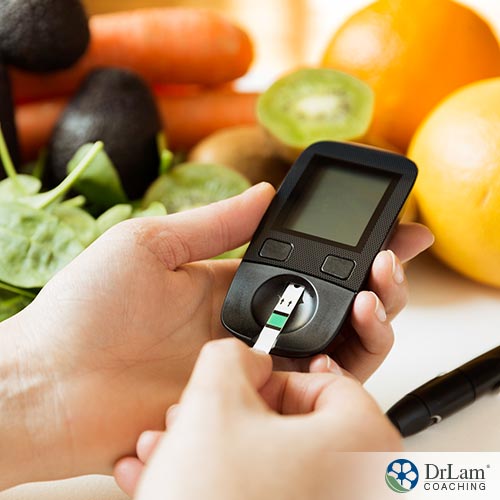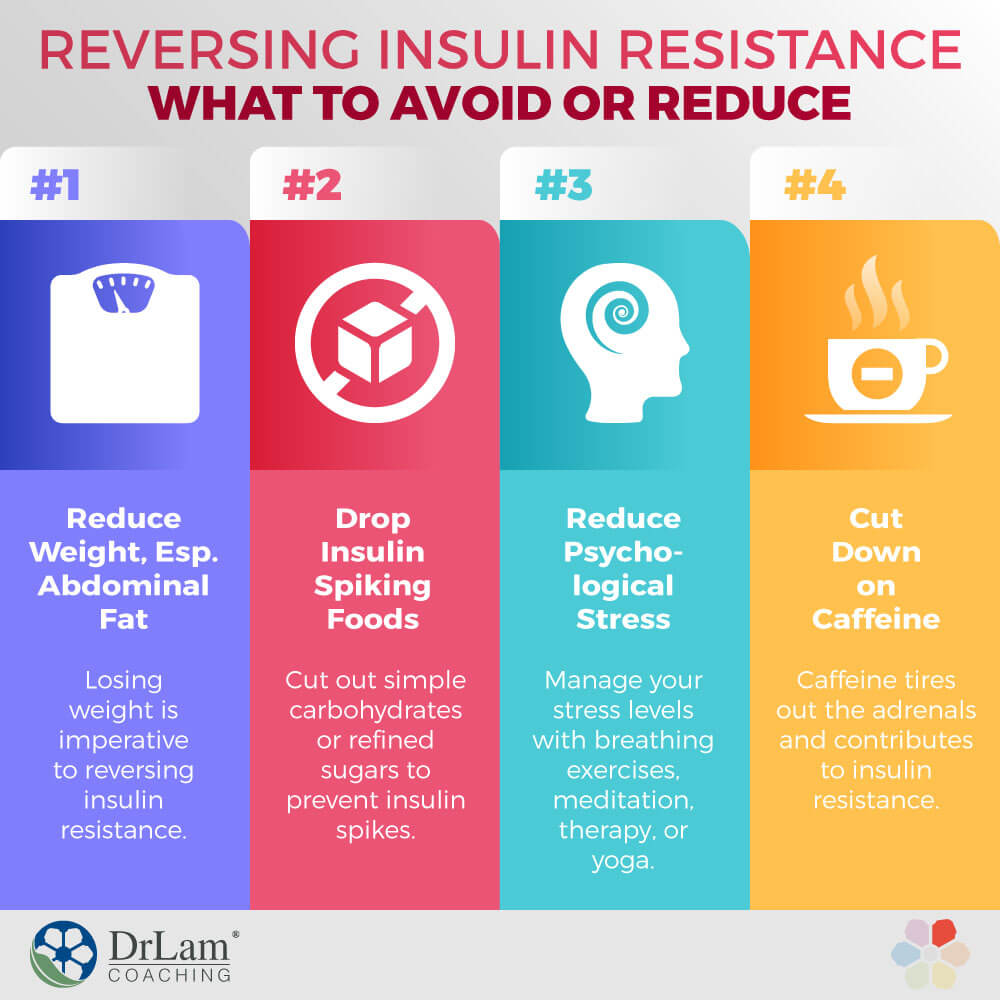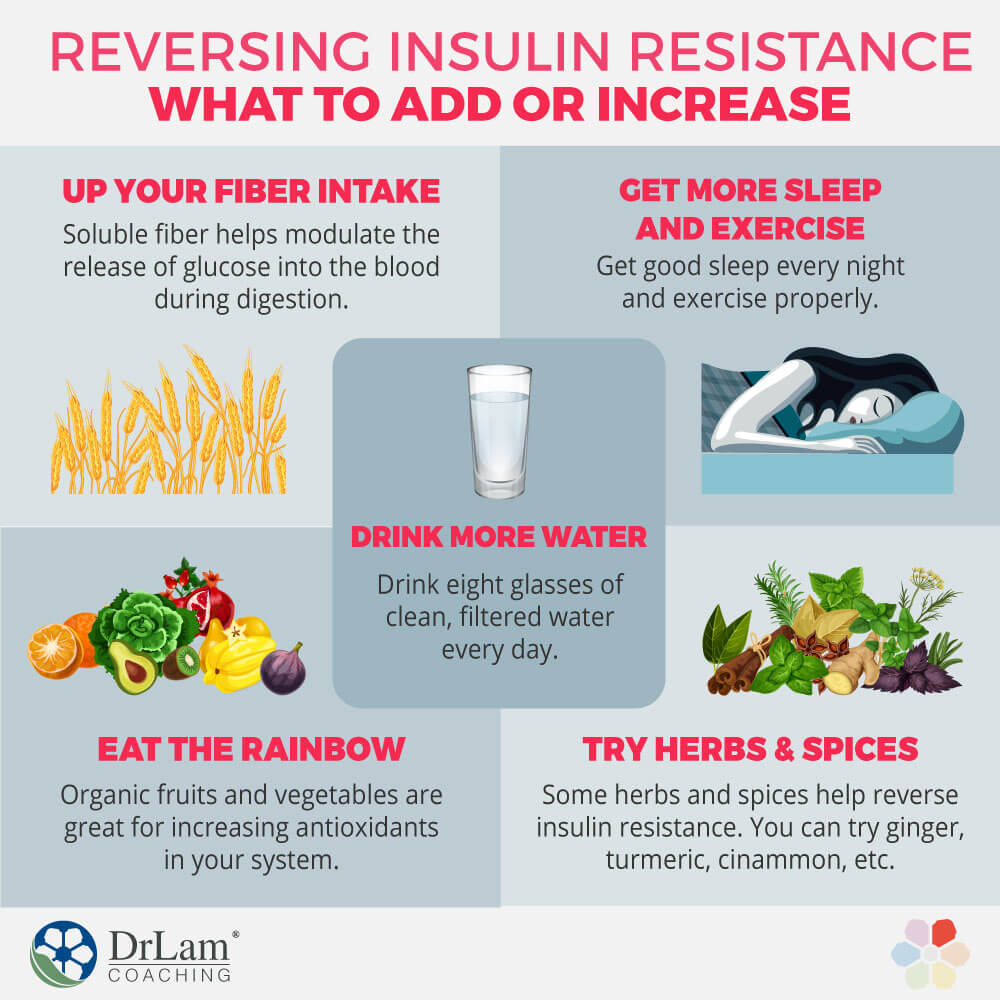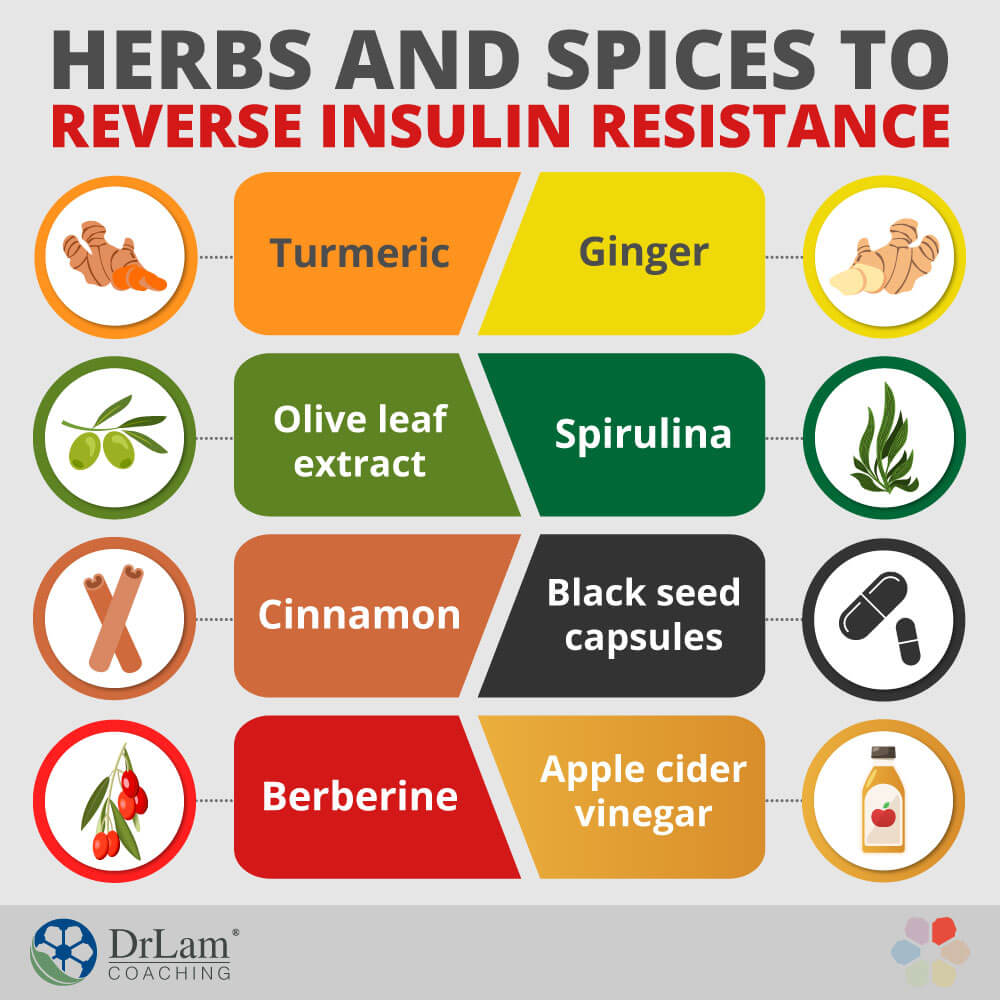 Whether you have diabetes, prediabetes, or issues with controlling your blood sugar levels, you’ll want to make reversing insulin resistance a top priority. This could help you with weight issues, protect your organs from complications down the line, boost your energy levels, and add years to your life.
Whether you have diabetes, prediabetes, or issues with controlling your blood sugar levels, you’ll want to make reversing insulin resistance a top priority. This could help you with weight issues, protect your organs from complications down the line, boost your energy levels, and add years to your life.
Insulin is one of the most essential hormones for life. Once glucose is released into your bloodstream after digestion, insulin helps move it into your cells where it is needed for producing ATP—the energy you need to live and function. Without insulin, you would die in a matter of days. Another one of insulin’s jobs is to help you store excess glucose in the liver as glycogen, which is later released by the liver when your body needs more glucose, for example, during sleep.
If more glucose available than the amount your cells need and the amount your liver can store as glycogen, excess glucose is stored as saturated fatty acids, which is why you may gain weight if you consume too much sugar.
Insulin is produced by beta cells in the pancreas in response to glucose levels in your blood. In some people, their beta cells have been completely destroyed (most type 1 diabetics) and in others, their beta cells simply produce less insulin (some type 2 diabetics). Other people may produce enough insulin, however, a number of different factors have made their cells resistant to the insulin produced in their pancreas.
But why would cells resist insulin in the first place? Despite the seriousness of the health conditions caused by insulin resistance, it’s actually a cellular self-defense mechanism—an attempt to ward off damage due to excess insulin.
The cycle begins as follows: You eat a large amount of high glycemic index foods, such as refined sugars and simple carbohydrates—common in the Standard American Diet—therefore, your pancreas must pump out a lot of insulin to remove it from your blood; But now your cells are exposed to too much insulin and too much sugar, both damaging to your health; In response, your cells begin to close up and resist insulin in an attempt to keep out this excess insulin and sugar.
In most cases, if enough insulin is pumped out by the pancreas, cellular resistance can be overcome, however, the ability of your pancreas to maintain this demand is limited, and may lead to problems. So, cellular resistance coupled with pancreatic exhaustion of the pancreas can cause the metabolic dysfunction referred to as insulin resistance.
This is why insulin resistance is common in people who are overweight since they tend to eat more calories and their pancreas must, therefore, pump out more insulin. Insulin resistance can also be caused by eating too much unhealthy fat, as these fats can enter your cells resulting in a “clogging” effect that doesn’t allow enough insulin and sugar to enter your cells. A sedentary lifestyle can be another contributing factor.
Insulin resistance is becoming more and more common as unhealthy diets and stress levels become the norm, and can affect both diabetics and non-diabetics. That’s why reversing insulin resistance should be a key consideration for anyone who is overweight or has issues controlling their blood sugar levels. It’s also essential for those suffering from other hormonal imbalances and metabolic issues such as Adrenal Fatigue Syndrome (AFS).
If you’re in optimal health, your body’s metabolism and hormonal systems work together in perfect harmony. A slight disturbance here or there is compensated for and your system goes back to a state of homeostasis. Unfortunately, a strong enough disturbance or frequent disturbances may eventually throw your hormones and metabolism out of balance.
Chronic stress, whether physical or psychological, is one such disturbance that can affects your whole body. When your NeuroEndoMetabolic (NEM) stress response is activated, many organs and systems become engaged in order to ward off the harmful effects of stress. This includes the adrenal glands, which pump out cortisol—the body’s main anti-stress hormone—as part of the NEM response.
Cortisol and insulin are intimately linked, as are stress and insulin resistance. As already mentioned, insulin resistance is a byproduct of repeatedly experiencing excess glucose in your bloodstream. When you eat something with a high glycemic index and it is not accompanied by enough fiber to regulate the release of its sugar contents, your blood sugar levels spike. This triggers a spike in the release of insulin, usually resulting in a hypoglycemic episode.
 Hypoglycemia occurs when too much insulin is released followed by the removal of too much sugar. This is a huge stressor on your system and triggers the release of cortisol. One of the main functions of cortisol is to regulate blood sugar levels. In the case of hypoglycemia, cortisol works to raise blood glucose levels by triggering the release of glucose from the liver into the blood, which then triggers sugar cravings in an attempt to replenish lost stores. Unfortunately, when this occurs most people continue to overdo their sugar intake and the cycle is repeated once again.
Hypoglycemia occurs when too much insulin is released followed by the removal of too much sugar. This is a huge stressor on your system and triggers the release of cortisol. One of the main functions of cortisol is to regulate blood sugar levels. In the case of hypoglycemia, cortisol works to raise blood glucose levels by triggering the release of glucose from the liver into the blood, which then triggers sugar cravings in an attempt to replenish lost stores. Unfortunately, when this occurs most people continue to overdo their sugar intake and the cycle is repeated once again.
These ups and downs of sugar—and consequently, insulin and cortisol—are extremely harmful, exhausting the pancreas and adrenal glands causing both insulin resistance and Adrenal Fatigue Syndrome (AFS). Symptoms of AFS include fatigue, weight issues, sleep problems, mood disturbances, food cravings, lowered immunity, lowered fertility, hypoglycemia, and food and drug sensitivities.
Insulin resistance shares many of the same symptoms of AFS, and both conditions may aggravate each other. The good news is that by addressing one, you may see improvements in the other. Moreover, some of the methods that support recovery from one condition also support recovery from the other. In this article, we’ll focus more on reversing insulin resistance, however, by default, your adrenals will become healthier and your NEM system will regain balance.

There are a lot of different herbs, supplements, foods, and exercises that can help with reversing insulin resistance, but unless you also address the root cause, you’ll be fighting an uphill battle. Therefore, as you begin to stock up on all the goodies, you also need to get rid of the baddies.
The vast majority of people with insulin resistance are overweight or obese, therefore, losing weight is imperative to reversing insulin resistance. Of course, this is easier said than done, but even a little weight management can go a long way. Abdominal fat is the biggest indicator of insulin resistance and is implicated in numerous other diseases and health problems. So make it a top priority to reduce belly fat.
If you have AFS, the Adrenal Fatigue Diet will help you lose weight and strengthen your adrenals at the same time. Adrenal Fatigue can make losing weight even more difficult due to the simple fact that fatigue is a central theme of AFS, and going to the gym or making radical changes to your lifestyle can seem overwhelming. That’s why we recommend starting with your diet.
 Other than losing weight, the Adrenal Fatigue Diet may aid reversing insulin resistance because it is very low on simple carbohydrates and contains no refined sugars. It is also full of fiber and includes some healthy fats too, which help to slow the breakdown and release of sugar into the blood.
Other than losing weight, the Adrenal Fatigue Diet may aid reversing insulin resistance because it is very low on simple carbohydrates and contains no refined sugars. It is also full of fiber and includes some healthy fats too, which help to slow the breakdown and release of sugar into the blood.
Without blood sugar spikes, your pancreas won’t be overworked and insulin levels won’t exceed their healthy limit. After some time, your cells will begin to lose their resistance to insulin and as a result, your system will gradually require less insulin to move and store glucose.
Trans fats and excess protein have also been shown to increase insulin release and therefore, may also contribute to insulin resistance. Healthy fats and moderate amounts of protein are great. Animal protein is fine as long as it comes from organic/grass-fed meats. Protein powder is another alternative, especially for diabetics.
Since we’re on the topic of AFS, reducing or managing psychological stress will not only help your adrenal glands recover, but can also helps with reducing insulin resistance. As we’ve already mentioned, cortisol raises blood sugar levels by breaking down glycogen stores and stimulating cravings for sugary foods. Cortisol is released not only when you are physically stressed but also when you are psychologically stressed.
All kinds of stress reduction techniques can be used to break this cycle. If you can drop certain particularly stressful obligations in your life then this would be a great time to do so. Although some stressful situations can’t be avoided, you can manage your stress levels with breathing exercises, meditation, therapy, or yoga. There are hundreds of options out there, so find the one that suits you best.
 Those suffering from AFS often find themselves drinking a lot of coffee or energy drinks to stave off fatigue, but unfortunately, caffeine actually tires out the adrenals even more and contributes to insulin resistance.
Those suffering from AFS often find themselves drinking a lot of coffee or energy drinks to stave off fatigue, but unfortunately, caffeine actually tires out the adrenals even more and contributes to insulin resistance.
With the exception of green tea, gradually cutting down your caffeine intake is an excellent way to improve both insulin resistance and Adrenal Fatigue. Just make sure you do it slowly to avoid adrenal crashes.

Now that you’ve eliminated or reduced things that cause or increase insulin resistance, it’s time to add some things that reverse insulin resistance naturally. Do so gradually so you don’t become overwhelmed or experience sudden hypoglycemia by increasing your insulin sensitivity too quickly.
Soluble fiber is particularly important. Whereas insoluble fiber bulks up your stool making your bowel movements timely and easy and is still important, it doesn’t have as much impact on insulin sensitivity as soluble fiber.
Soluble fiber balances the microbiome, feeds good bacteria in the gut, and helps modulate the release of glucose into the blood during digestion.
Organic fruits and vegetables of all colors are great for increasing antioxidants in your system. Insulin resistance can create a state of oxidative stress in the body as the number of free radicals increases, which speeds up aging and can trigger an array of health problems.
If you have AFS and insulin resistance, be careful not to eat too many high glycemic index fruits, especially at first, since they may cause a spike in your blood sugar levels a little too quickly. Berries are a great option since they can increase insulin sensitivity and are also a rich source of antioxidants.
 Dehydration is a huge stressor on the body. To keep everything running smoothly and maintain proper function of your liver and detoxification systems, which flush out excess hormones and metabolic byproducts, you must drink eight glasses of clean, filtered water every day.
Dehydration is a huge stressor on the body. To keep everything running smoothly and maintain proper function of your liver and detoxification systems, which flush out excess hormones and metabolic byproducts, you must drink eight glasses of clean, filtered water every day.
If you have advanced AFS, do not increase your water intake too quickly since this could mess up your sodium-potassium levels. You’ll need to increase your water intake slowly.

A number of different herbs and spices have been shown to help with reversing insulin resistance, so try these one at a time while you continue monitoring your insulin levels:
Do not go off of your prescribed medication without consulting your doctor, even if you see improvements. Also, make sure you don’t overdo it as this could increase your risk of hypoglycemia and adrenal crashes.
One of the main symptoms of AFS is insomnia—both sleep-onset and sleep-maintenance insomnia. Unfortunately, a lack of sleep affects the entire system, including insulin sensitivity, thus, ensuring you get good sleep every night is extremely important. Make sure your room is dark and cool, don’t use electronics at least two hours before bed (or at the very least use blue light blocking filters or glasses), eat a few nuts before bed so you don’t wake up due to hypoglycemia, and make sure you’re not disturbed.
Only do exercise that suits your current condition. If you are suffering from advanced AFS or another debilitating condition, simple things like adrenal breathing exercises, adrenal yoga, or a short walk can do wonders. As your health improves, you can increase your activity levels, which will, in turn, help with reversing insulin resistance.
© Copyright 2018 Michael Lam, M.D. All Rights Reserved.
Absolutely! Reversing insulin resistance using this step-by-step process is a surefire way of seeing huge health improvements without changing your medication or trying expensive treatments. Just take it slow, try one thing at a time, and monitor your progress.
